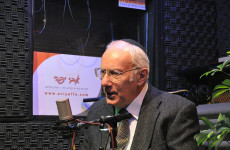Dr. Bianca Rosenberg-Hagen: ‘Too Many Face-lifts Can Turn Woman Into Plastic Surgery Cripple! Only Once Or Twice In A Lifetime’
‘Sometimes Plastic Surgery To Make People Happy Is Like Saving Their Life – But Some Surgeons Overdo It’
‘Israeli Plastic Surgery Enjoys High International Standard’
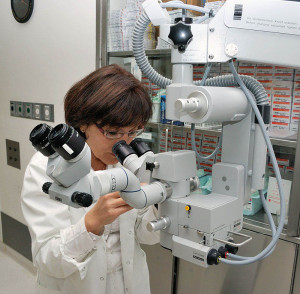
How many face-lifts should a woman have in her lifetime? How early should a face-lift be conducted? These are just some of the questions discussed by Dr. Bianca Rosenberg-Hagen, a leading Israeli plastic surgeon in a frank and wide ranging interview with IsraCast. Dr. Rosenberg-Hagen, who specialized in plastic-surgery at the Montefiore-Einstein Medical Center in New York, also has timely advice for both men and women, including those with breast cancer.
Welcome to our IsraCast studio in Jerusalem. We are speaking with Dr. Bianca Rosenberg-Hagen, a leading Israeli plastic surgeon. She is director of the plastic surgery center in Misgav Ladach Hospital in Jerusalem. Dr. Rosenberg-Hagen, could you begin at the beginning of your medical career over thirty years ago? After first training in general surgery, you decided to specialize in plastic surgery. Just why did you decide to do so?
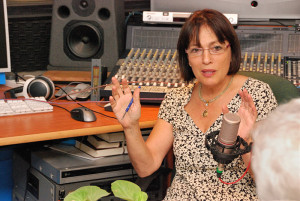
Well, I always wanted to be a plastic surgeon, when I started my medical studies I didn’t know that this would be the name of my future profession. But I always wanted to give people the feeling of well-being about their looks, about their self esteem, and plastic surgery is a very interesting profession, because no one technique is similar to another. No person has the same problem as another. So the reconstructive field is very, very artistic, very creative. You have to do a nose, or an ear, or a lip, and you have to reconstruct – or a breast, and you have a reconstruction. You have to have some artistic view, some skills, it’s a profession that I like to perform even nowadays, I am very happy with what I’m doing.
Well, we all know the effect of physical pain, when you have a disease or have to have an operation, but how severe is the mental pain for people that have been born with defects, or had amputations due to cancer, or for example been in car accidents, or victims of terror attacks, even?
My most unhappy patients are the most beautiful women that you can ever meet, because they feel like they are losing something with time
Sometimes I am amazed at how strong mental pain is – even more than physical pain. And it’s very interesting because my most unhappy patients are the most beautiful women that you can ever meet, because they feel like they are losing something with time. So they are very unhappy about very small defects that nobody would ever consider as a defect. And sometimes you have to screen them out from surgery, or convince them not to do surgery because we can never be perfect. And sometimes people who were born with a defect, they accept it. People who get a defect later in their life, it’s very difficult for them to accept it.
We’re living much longer, we all want to look better as long as we can. What is your opinion of cosmetic surgery as compared to reconstructive surgery, people who really have to have plastic surgery?
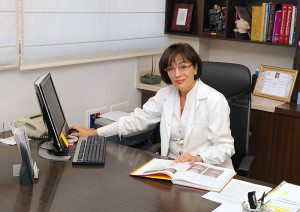
When I went into medicine, and then into plastic surgery, I never imagined that I would deal with aesthetic surgery. I never wanted to. I never thought about having a private practice, I said: ‘I’m a woman, I’m not the one that has to earn money, I will marry a rich husband and I will do exactly the most important things, heroic things, terror surgery, and plastic surgery, burns, amputations, microsurgery’ – this is what I wanted to do. And then life brought me to do more and more aesthetic surgery and I realized that sometimes people who do aesthetic surgery are so happy and grateful that I don’t consider aesthetic surgery as being less important than saving life. Sometimes making people happy is saving their life. In the beginning of the twentieth century, life expectancy before World War I was 45 for a woman and 40 for a man. Now it’s double. People at fifty, they divorce, they remarry, they want to look exactly like they were before. You know, it’s a young world, we do fitness, we eat right, and we do a lot more plastic surgery. And also plastic surgery techniques and skills became so fine, it is easy, we do for example face-lifts, with local anesthesia and sedation and we release the patient the same day. We do breast reconstruction with general anesthesia, but we release the patients the day after. They don’t have to be hospitalized for long, complications are less, antibiotics take care of infection, and anesthesia is not something that we consider as very dangerous.
Well, with this rush, women and men in this day and age to look better, to try and be beautiful by going under the knife, does this not open the possibility for many charlatans to exploit this situation where people are willing to pay huge amounts of money for this aesthetic surgery?
I really would like the pendulum to go back a little bit, and we should come back to our senses, Even if we plastic surgeons have less work. I think we should choose our patients, and not do unnecessary surgery
In fact I’m very sad to tell you about what our profession has become. I think the recent exaggeration in the amount of surgery that we do, in the kind of surgery that we do. You know, putting a thousand CCs in one breast is really, really pitiful. And I think the media has brainwashed us with ideals of beauty and the ideal of being beautiful. We also have all these TV programs about models and all this kind of thing – it seems like young women are brainwashed by that. I am against plastic surgery in this regard. I am against exaggerated plastic surgery. I am against doing face-lifts, I’ve seen this tainted blue face-lift, my colleagues, they do face-lifts on 36 year old women! Why should you do a face-lift on a 36 year old woman? You should start as late as possible, because doing many surgeries will end up with you looking like a monster, or a plastic surgery cripple. This is what I call them, the New York look, plastic surgery cripples. You have to look natural, and even if you have one wrinkle or two, it’s OK. It doesn’t make you less nice, or less beautiful. I really would like the pendulum to go back a little bit, and we should come back to our senses, Even if we plastic surgeons have less work. I think we should choose our patients, and not do unnecessary surgery.
Well, on this score, how many times should a woman have a face-lift in her lifetime?
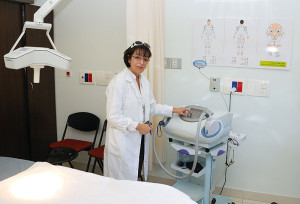
I am telling my patients this: All surgery is harmful. Whenever you touch your skin with the knife, there is a scar. Whenever you touch the skin, you jeopardize your blood supply. And doing many face-lifts is going to make you a plastic surgery cripple because the skin without the blood supply becomes thinner and thinner. It doesn’t look natural anymore. That’s why I am against plastic surgeons who advise their patients to do early surgery. I am consulting my patients and telling them, I am advising them to postpone their surgery as much as they can. And we have all other kinds of modalities like peel, or injecting some materials, or fillers, or Botox, and to postpone surgery as much as you can, because you have to do surgery only once, or maybe twice in your lifetime, in order to look well. I think it’s worse to look unnatural than to have a small wrinkle. Our goal is to do surgery that is unnoticeable.
In addition to living longer, our generations are afflicted by cancer, and breast cancer probably combines the reconstructive aspect with the aesthetic aspect of plastic surgery more than any other kinds of cancer. What do you as a plastic surgeon tell a woman, any woman, or any young woman, a mother of children, who has received the bad news, sits before you, and is terrified of what the future holds for her? What can you tell her about after the breast is removed, what kind of body she’s going to have after you perform your plastic surgery?
Let me tell you about that, you know I really pity women who receive the bad news. Not because it’s terrible, because now we have a very high cure rate, especially when we diagnose the disease very early. But I feel pity because they have to take a decision in a very short time about what to do and they don’t always get the right information from the medical profession. I think if they go to an oncologist and then to the general surgeon, and then to the plastic surgeon, sometimes they don’t arrive at the plastic surgeon because the general surgeon doesn’t recommend this for them. Moreover, they get so much mixed information that they cannot really understand exactly what they have to do, especially if they don’t have a medical education. And even if they have a medical education, it’s a very difficult decision. I think we should give consultation of all three or four professions together, oncologists, general surgeons, plastic surgeons, genetic counseling, sometimes radiology, sometimes psychology, and we have to do and find out together with ordinary consultation how to give the patient the right idea of what to do next, what is first, what is more important and what is less. Second, I think I would like to stress first of all, for the patient, that the most important thing is to be free of disease. We have to think that beauty comes next or last.
I think I would like to stress first of all, for the patient, that the most important thing is to be free of disease. We have to think that beauty comes next or last
But, on the other hand, I can give her the idea that since I started my profession thirty years ago, many things have changed. And now we know to give much, much better results and get aesthetic outcome that is far beyond what we could do ten and twenty years ago. Now we have a technique, for example, we can do a skin sparing mastectomy, or nipple sparing mastectomy. We can take the breast out while leaving the entire skin envelope intact. So we can put the prosthesis inside and the patient wakes up and she hardly has a scar on her breast – she has a full breast, without any complicated surgery, and it looks beautiful, sometimes the patient tells me: ‘You made my breasts look better than they were before because before they were a little bit sagging and now they look nicer’. So the first thing I have to stress that they have to do the right things from the oncological or surgical point of view, but on the other hand I can give them hope that if they do the right thing they can be healthy, and also have a nice, complete body. I can show them a book with nice pictures, how women with mastectomy can really like their bodies, they take pictures and they look free together with their husband, or companions.
Well, without sounding chauvinistic, from one point of view or the other, do you think, as a female plastic surgeon, do you have a better understanding of a woman’s feelings, how she looks at her body than perhaps a male plastic surgeon does when it comes to breast surgery?
I don’t think so. I think men, and some of my best friends and colleagues, have a good understanding of what women feel because they deal with women all their lives, and they understand them.
But they’re still not inside the same bodies.
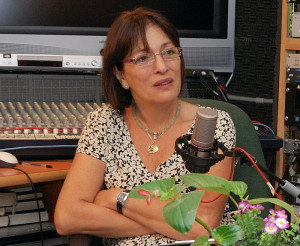
I found out a very surprising thing, that women surgeons tend to give up breasts easier than men surgeons. Men are still attached to our breasts more than we are
But they’re not inside the same body and the same mind. I found out a very surprising thing, that women surgeons tend to give up breasts easier than men surgeons. Men are still attached to our breasts more than we are. In order to be free of disease and without fear, many women say: ‘It’s not important for me to have breasts’ but men wouldn’t say the same thing. They don’t accept it as easy as a woman is ready to give up her breast.
Well, men are also the victim of breast cancer.
That’s right, and I really would like to stress that men, if they have something going on or they see something, or one breast is bigger than the other, they should go and check it out, because men can get also breast cancer, and most people, they don’t understand that.
I would like to ask you this personal question. It must give someone like yourself a great sense of satisfaction in your surgery in being able to recreate part of a woman or a man’s body that, compared to most other surgeries, intervention, cutting and slicing and so forth, but here you also do that, but in the end you recreate and give back part of a person’s body, something which also affects their very soul.
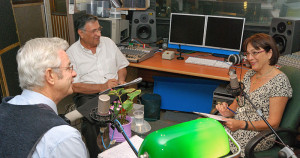
Let me tell you something. The sentence that makes me the most happy that I hear from my patients, not a thank you, and really, patients are very grateful, you know – I feel like it’s unjust that a heart surgeon or a neurosurgeon doesn’t get the thanks that I get from my patients. But the sentence that makes me most excited is: ‘Dr. Rosenberg, this is exactly what I imagined I will have!’ And this makes me very happy, and it is not only about creating things, artistically. It’s understanding what my patient wants to have. Because some like bigger breasts, some like smaller breasts, some like a higher eyebrow, lower eyebrow, and beauty is in the eye of the beholder, so I have to do the surgery for them, and not according to my point of view. If there is a very big difference between my point of view and their point of view, sometimes I send them to another surgeon if I don’t see eye to eye with them, or maybe they ask for something impossible that they cannot really do.
How would you compare the standard of plastic surgery in Israel today to other leading medical centers in the world?
I think we are in a very good place. I travel every year to conventions in New York, San Francisco, and I feel like we are in a very good place. It’s because it doesn’t depend on the education or the experience sometimes, it depends on your empathy, it depends on your skills, and I think here we do care for the patients. It’s not only business, you know. In the United States, many of my colleagues consider their profession a pure business – they have PRs, coordinators, business managers and we don’t use them here. We have our patients, we listen to them, if we can fulfill their wishes, we do, if we cannot, we have to admit: ‘I’m sorry, I cannot do it’. In about forty percent of the people that come to consult with me I am refusing to do surgery. Sometimes because their expectations are too big, because if a woman comes and she says: ‘my husband has a lover, I want to do a face-lift’, I tell her: ‘Your husband won’t come back if you do a face-lift’. So you have to take in consideration what the patient expects from the surgery, if their expectation is realistic then he is operable in my eyes.
You have obviously a very, very busy schedule. But do you have any time or energy to develop your own particular research in the field, an area which is of particular importance to you personally in plastic surgery?
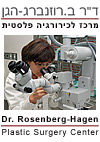 Yes, you know technology has done a lot in our field, we have developed all kinds of material that we inject, like fillers and even today I really used a very new material, I went to Sweden and to France to learn about new materials that we can develop to augment tissue without any side effects. Or we do some research about microsurgery, developing new methods and skills. Very little, but enough.
Yes, you know technology has done a lot in our field, we have developed all kinds of material that we inject, like fillers and even today I really used a very new material, I went to Sweden and to France to learn about new materials that we can develop to augment tissue without any side effects. Or we do some research about microsurgery, developing new methods and skills. Very little, but enough.
Website of Dr. Bianka Rosenberg: http://www.bplastic.co.il/



